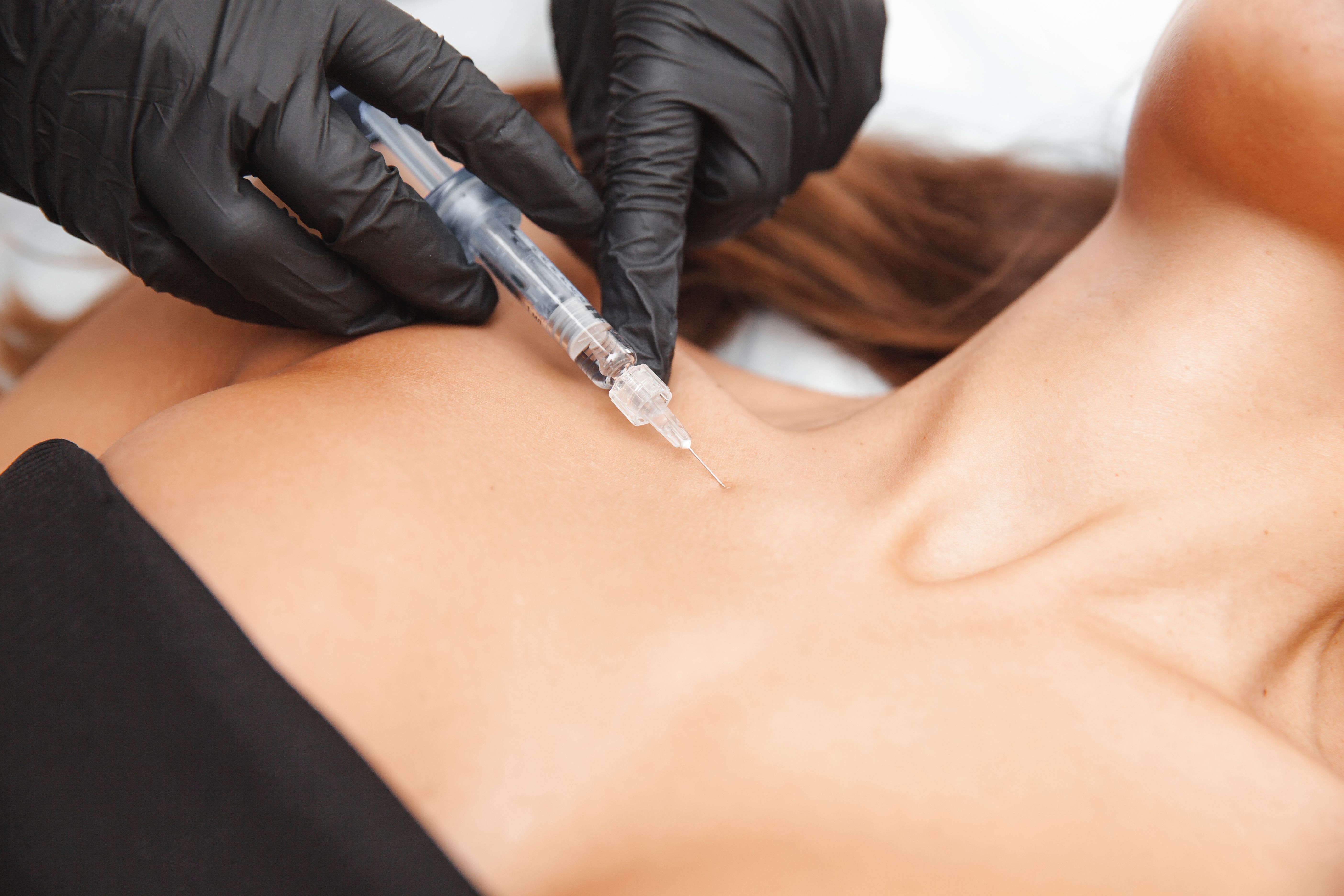- Case-Based Roundtable
- General Dermatology
- Eczema
- Chronic Hand Eczema
- Alopecia
- Aesthetics
- Vitiligo
- COVID-19
- Actinic Keratosis
- Precision Medicine and Biologics
- Rare Disease
- Wound Care
- Rosacea
- Psoriasis
- Psoriatic Arthritis
- Atopic Dermatitis
- Melasma
- NP and PA
- Skin Cancer
- Hidradenitis Suppurativa
- Drug Watch
- Pigmentary Disorders
- Acne
- Pediatric Dermatology
- Practice Management
- Prurigo Nodularis
- Buy-and-Bill
Article
Neuromodulators have therapeutic potential for psoriasis
Outside of their aesthetic applications, neuromodulators show promise in treating inflammatory skin conditions including psoriasis, according to an expert at Cosmetic Surgery Forum.
Las Vegas - Outside of their aesthetic applications, neuromodulators show promise in treating inflammatory skin conditions including psoriasis, according to an expert at Cosmetic Surgery Forum, held here.
Regarding inflammatory skin diseases, Erin Gilbert, M.D., Ph.D., proposed that dermatologists look increasingly at type A neuromodulators (onabotulinum, abobotulinum, incobotulinum) in particular as a potential therapeutic option for psoriasis. Type B neuromodulators still have issues with duration of response, says Dr. Gilbert, who is an assistant professor of dermatology at SUNY Downstate Medical Center, New York.
At the neuromuscular junction, type A neuromodulators inhibit acetylcholine release, thereby decreasing skeletal muscular contraction.
“But we also know from some published data that type A neuromodulators reduce pain and itch. This is a curious phenomenon that we’ve seen in many different contexts,” she says. Additionally, she said that many dermatologists don’t know that these neuromodulators also inhibit the release of other neuroactive peptides including substance P, calcitonin gene-related peptide (CGRP), glutamate and vasoactive intestinal peptide.
Psoriasis solutions
Regarding psoriasis, Dr. Gilbert has worked with her colleague Nicole L. Ward, Ph.D., assistant professor of dermatology at Case Western Reserve University, Cleveland, on the effects of botulinum type A toxin in a mouse model. Dr. Ward’s lab works extensively with the KC-Tie2 mouse model to evaluate potential therapies. The KC-Tie2 mouse is a transgenic mouse with increased numbers of cutaneous nerves.
“Much like in human psoriasis,” Dr. Gilbert says, “this mouse also exhibits increased acanthosis and shares some immunologic features with the disease at the cellular level.”
Dr. Gilbert says her work and Dr. Ward’s work complement each other, as they are both neuroscientists. Dr. Ward noted first that lesional and nonlesional skin of patients with psoriasis contains increased numbers of nerves, according to Dr. Gilbert.
“Neuropeptide expression is higher in psoriatic skin. There’s also a lot of data regarding the immunologic component of psoriasis,” she says.
Examining nerve damage
Factors including psychological stress, immunosuppression and chronic inflammation due to background diseases such as diabetes or hypertension, as well as comorbidities such as alcohol consumption or smoking, can exacerbate psoriasis, according to Dr. Gilbert.
In one clinical report, a human patient with bilateral psoriasis who experienced nerve damage as the result of a brachial plexus injury experienced complete resolution of the psoriasis on the corresponding side of his body (Joseph T, Kurian J, Warwick DJ, Friedmann PS. Br J Dermatol. 2005;152(1):185-186). Other patients with bilateral psoriasis, such as those with breast cancer who have undergone unilateral mastectomy, have reported similar focal resolution of psoriasis following nerve damage, Dr. Gilbert says.
Building on this knowledge, Dr. Ward performed cutaneous axotomy on the mice, harvested skin 10 days later, and found decreased nerve numbers on the denervated side versus the control side. This led to a 30 percent improvement in acanthosis, plus a 40 percent decrease in CD11c+ dendritic cells.
“This is important because these dendritic cells are also found in human psoriasis. Dr. Ward also found a 30 percent decrease in the number of CD4+ T cells (Ostrowski SM, Belkadi A, Loyd CM, et al. J Invest Dermatol. 2011;131(7):1530-1538. Epub 2011 Apr 7). Therefore, we know that this mouse model mimics human disease,” Dr. Gilbert says.
Drs. Gilbert and Ward then attempted chemical denervation of the mice using nine units of abobotulinum toxin A (Dysport, Merz) per kilogram.
“Two weeks and six weeks postinjection,” Dr. Gilbert says, “we harvested skin from the treated and the control side. Exactly like the surgically denervated mice, we saw improved acanthosis and decreases in CD11c+ and CD4+ T cells (Ward NL, Kavlick KD, Diaconu D, et al. J Invest Dermatol. 2012;132(7):1927-1930). That’s pretty remarkable following a safe and single injection.”
Further studies
Based on this success, Dr. Ward has continued to work on the effects of botulinum type A toxin with further mouse studies, under a grant to Case Western Reserve University. Dr. Gilbert simultaneously has pursued off-label, single-treatment protocols, and has been successful in treating refractory plaque psoriasis. For example, she injected one patient with 10 units of Dysport in the left buttock, which was the site of a psoriasis plaque.
“One month after the injection, she had completely cleared this lesion, although lesions elsewhere on her body remained completely intact,” Dr. Gilbert says.
“It was a focal effect that lasted for seven months in this woman, due to a single Dysport injection. Essentially this is just the beginning” of research that she and Dr. Ward have planned.
Dr. Gilbert also has been evaluating type A neuromodulators for infections, with fairly impressive preliminary results, she added. She qualified this statement: “These are early days in our studies of human responses to botulinum toxin type A injections for inflammatory skin diseases, and we can’t expect that any two subjects will behave in the exact same manner. Randomized, controlled studies are ultimately needed.”
Disclosures: Dr. Gilbert is a consultant to Allergan and Merz Aesthetics.





